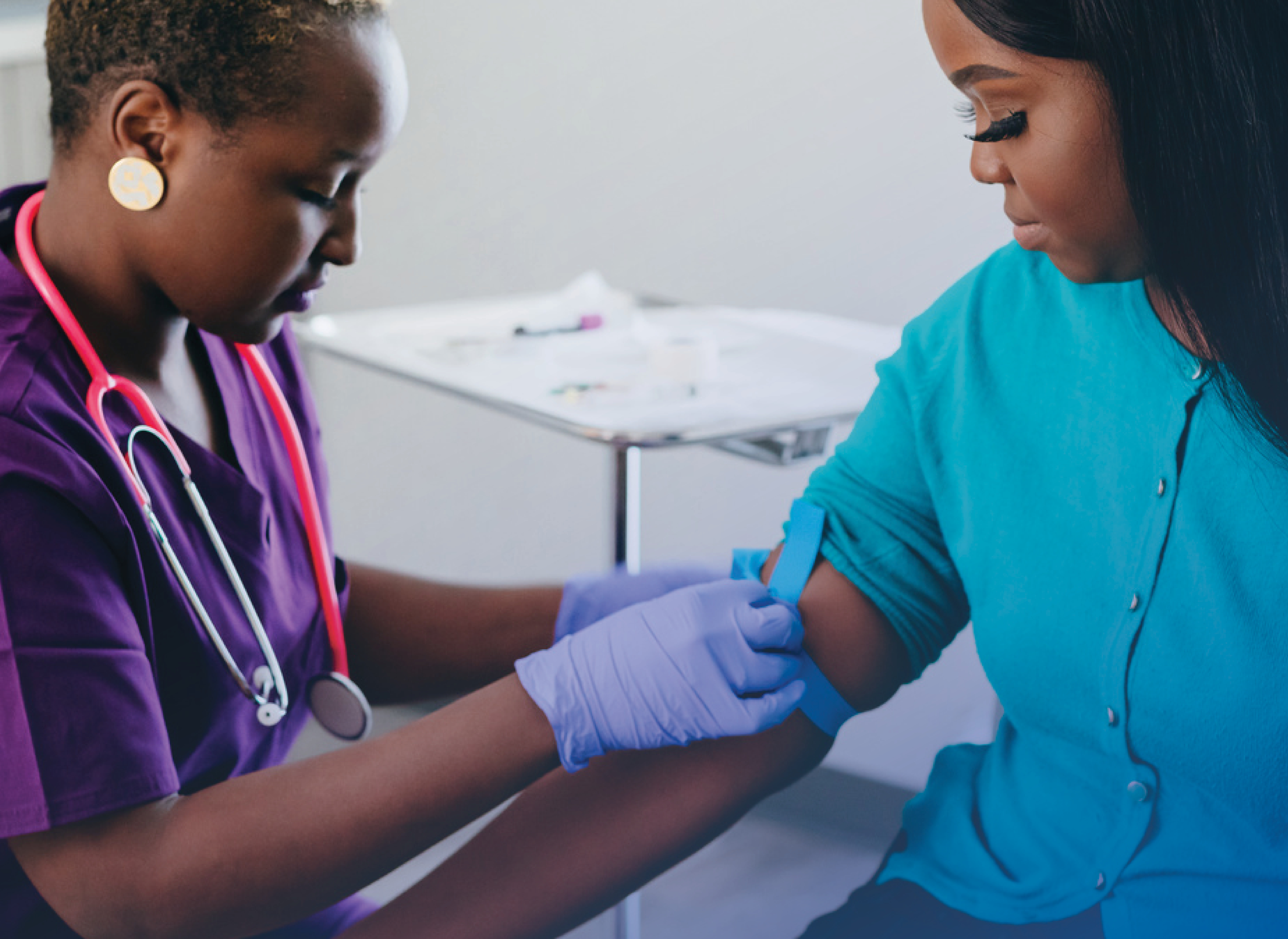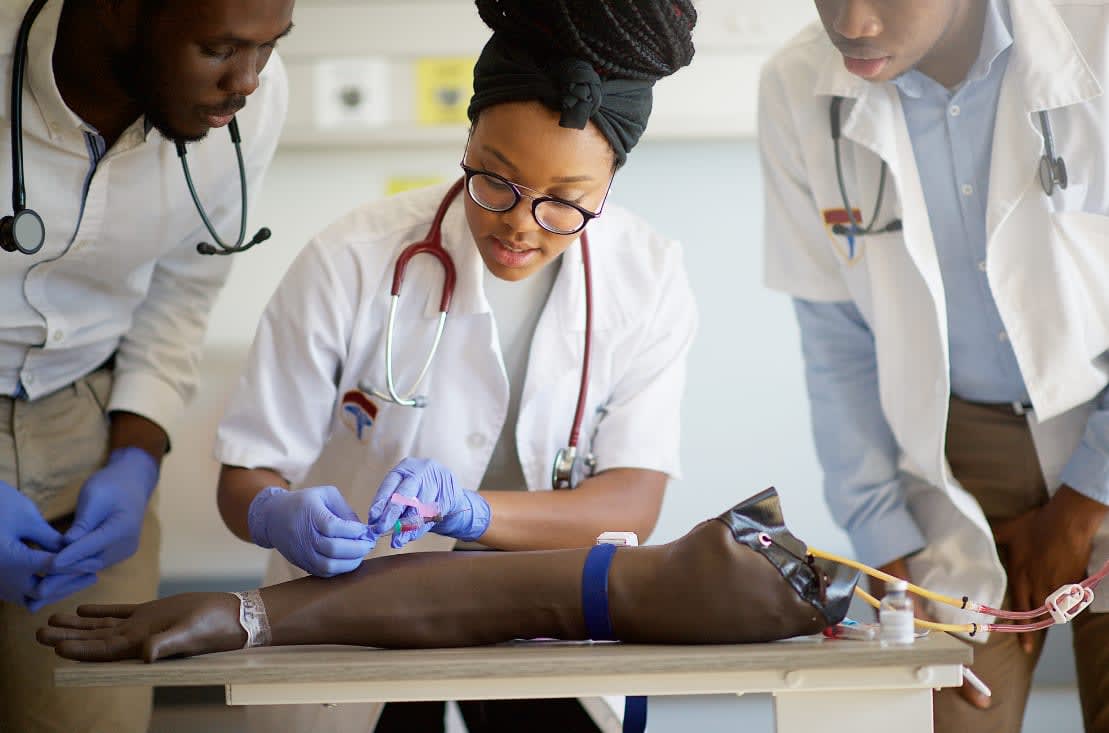Phlebotomy Classes Near Me: Career Impact Breakdown
Phlebotomy Classes Near Me: Career Impact Breakdown
Blog Article
The Path to Accreditation: Recognizing the Phlebotomy Training Program Trip and Its Relevance
As you consider the path to accreditation in phlebotomy, it's vital to understand the function you'll play in medical care. Your training will certainly cover important skills, from blood collection strategies to patient communication. Each part of the program prepares you for the challenges ahead. What precisely does the journey involve, and why is accreditation so vital for your future job? Allow's discover these questions further.

The Duty of Phlebotomists in Health Care
Phlebotomists play a vital role in the medical care system, functioning as the crucial link in between people and vital diagnostic screening. You'll do blood draws, making certain samples are collected properly and securely. Your know-how helps in detecting clinical conditions, checking health and wellness, and guiding treatment decisions.
In your everyday interactions, you'll require to establish depend on with clients, making them really feel comfortable throughout what may be a demanding experience. You are in charge of identifying and taking care of samples carefully to stop contamination or errors, which might influence test outcomes.
Beyond this, you'll typically function along with doctors and nurses, interacting essential details regarding people' problems. By mastering your skills, you contribute meaningfully to client care, making you a vital component of the clinical group.
Review of Phlebotomy Training Programs
When discovering phlebotomy training programs, you'll find various types designed to fit different schedules and learning styles. Each program helps you develop important skills like blood collection and client interaction. Understanding these options is key to choosing the right path for your career.
Sorts Of Educating Programs
Numerous kinds of training programs are readily available for those looking to become competent in phlebotomy. You can choose from certificate programs, which typically last a couple of months and concentrate on necessary skills. There are also diploma programs that provide an even more thorough education and learning, often lasting approximately a year. If you're trying to find a deeper understanding, an associate degree in a relevant area may be the right fit. On-line programs provide versatility for those balancing job or household commitments, allowing you to research at your own pace. In addition, some hospitals and clinics provide on-the-job training programs, offering sensible experience while you find out. Whatever path you choose, each program aims to outfit you with the essential skills for an effective phlebotomy occupation.

Trick Skills Established
Grasping phlebotomy requires a collection of vital abilities that are created via detailed training programs. Additionally, interaction skills are basic; you'll require to connect with clients, describe procedures, and put them at convenience. Each of these skills is crucial for your success as a licensed phlebotomist, making you a beneficial possession in any kind of health care setting.
Trick Parts of a Phlebotomy Course
In a phlebotomy training course, you'll concentrate on crucial topics that prepared for your future career. You'll take part in hands-on training that enables you to apply what you've discovered in real-world settings. Both the curriculum and functional experience are important for your success as a phlebotomist.
Core Educational Program Summary
While pursuing a phlebotomy training program, you'll experience a core educational program developed to outfit you with fundamental abilities and knowledge. Phlebotomy Training Course. This educational program usually consists of anatomy and physiology, concentrating on the blood circulation system and comprehending blood parts. You'll also find out around different kinds of blood collection approaches, including venipuncture and capillary leak strategies
Additionally, infection control and security methods are important elements, guaranteeing you recognize how to keep a sterile atmosphere. You'll study patient communication, stressing communication and empathy, which are important for reducing person anxiety. Honest and legal factors to consider will be resolved, preparing you for real-world responsibilities. This foundational understanding will certainly allow you to excel as a phlebotomist and provide high quality care in scientific setups.
Hands-On Training Experience
Getting hands-on experience is an important part of your phlebotomy training program. This useful training allows you to use what you've found out in a real-world setting, enhancing your abilities and confidence. Phlebotomy school.
Additionally, you'll obtain the possibility to interact with people, which is vital for developing your interaction abilities. This combination of technological efficiency and social skills is essential for your success as a licensed phlebotomist. Inevitably, hands-on training is where theory fulfills method, strengthening your knowledge and preparedness for certification.
Accreditation and Licensing Needs
Before you can begin your career in phlebotomy, it is crucial to recognize the accreditation and licensing needs that differ by state. A lot of states need phlebotomists to hold a qualification from a recognized organization, such as the National Phlebotomy Organization or the American Culture for Medical Pathology. These qualifications generally include passing a test that tests your understanding and abilities in the area.
In addition to qualification, some states have specific licensing demands. You might require to finish a certain number of hours in scientific technique, send evidence of training, or undergo a background check. It is necessary to research your state's laws to make certain you meet all necessary requirements.
Staying notified regarding these demands not just aids you safeguard a placement yet also enhances your integrity as a specialist. By meeting these needs, you'll be well on your means to an effective job in phlebotomy.
Hands-On Training and Practical Experience
Hands-on training and practical experience are essential components of your phlebotomy education, as they allow you to use academic expertise in real-world scenarios. During your training, you'll involve in supervised venipuncture, learn proper techniques, and become accustomed to numerous blood collection devices. This direct involvement is crucial for building your self-confidence and sharpening your skills.
You'll function closely with experienced professionals that can assist you with the nuances of person communication and sample handling. Each session not just enhances your understanding however additionally prepares you for the hectic atmosphere of healthcare setups.
Furthermore, many programs include scientific rotations, permitting you to experience varied settings, from hospitals to outpatient facilities. This exposure assists you adapt to different challenges and individual requirements, guaranteeing you're well-prepared for your future function. Embrace these chances, as they're vital to becoming an experienced and caring phlebotomist.
Obstacles Dealt With Throughout Training
While acquiring hands-on experience is essential, it's crucial to recognize the obstacles that can arise throughout your phlebotomy training. You could come across anxiety when doing procedures on genuine people, especially if you're brand-new to the atmosphere. The pressure to obtain everything right can be overwhelming. In addition, mastering the skills needed for blood attracts takes practice; you might have problem with technique at first.
Time monitoring can additionally be an obstacle, as balancing theory, sensible sessions, and personal commitments can feel daunting. You may encounter differing learning paces among your peers, causing sensations of self-doubt if you assume you're dropping behind. Finally, adapting to the different characters of trainers can be difficult, as each might have an one-of-a-kind teaching style.
Recognizing these obstacles early on can prepare you for success and help you develop resilience throughout your training trip.
Job Opportunities After Qualification

As you acquire experience, you could even consider focusing on areas like pediatric or senior citizen phlebotomy, satisfying specific person requirements. Some phlebotomists pick to advance their jobs by ending up being laboratory service technicians or pursuing more education in health care areas.
Furthermore, your qualification can result in duties in training or monitoring brand-new phlebotomists, allowing you to share your understanding. With the medical care market consistently growing, your skills will certainly always be in need, leading the way for a secure and fulfilling profession. Embrace the possibilities waiting for you!
Frequently Asked Inquiries
What Is the Typical Duration of a Phlebotomy Educating Training Course?
Phlebotomy training courses usually last around 4 to eight weeks. You'll participate in hands-on method, class guideline, and online knowing. Completing this training prepares you for accreditation and a fulfilling career in healthcare.
Are Online Phlebotomy Courses Available?
Yes, on the internet phlebotomy programs are readily available. They supply flexibility and benefit, Phlebotomy school enabling you to examine at your own rate. Just confirm the program is approved to fulfill certification requirements and gain important skills for your profession.
Just How Much Does Phlebotomy Training Normally Price?
Phlebotomy training commonly sets you back in between $700 and $2,500, relying on the program and area. You need to take into consideration factors like training course size, consisted of materials, and hands-on experience when selecting the best training for you.
What Prevail Prerequisites for Phlebotomy Training?
Usual requirements for phlebotomy training typically include a senior high school diploma or GED, booster shots, and a background check. Some programs might likewise require standard health care knowledge or qualifications, ensuring you're prepared for hands-on training.
Can I Function While Completing My Phlebotomy Training?
Yes, you can function while completing your phlebotomy training. Several trainees balance work with their studies, yet make specific to handle your time successfully to guarantee you fulfill both work and training dedications effectively.
Report this page